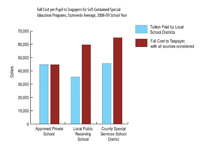NEWS RELEASE
Contact: Gerard Thiers, Executive Director
609-890-1400 x 12
For Immediate Release:
Report Shows Private Special Education Schools Cost New Jersey Taxpayers Less, Not More, Than Public Special Education Programs
Hamilton, NJ – A new report shows that when it comes to educating students with complex, multiple disabilities such as autism, it costs New Jersey taxpayers less when those services are provided by a private school than when they are provided by a specialized public program. In fact, state-approved private schools for students with disabilities may save taxpayers as much as 44% over comparable public programs.
The report issued by ASAH, a statewide not-for-profit organization, shows that while the full cost to educate these students in any setting, public or private, can exceed $45,000, private schools represent the least costly option.
Under federal law, school districts are required to provide a free, appropriate education to all children with disabilities. Most can be educated at their local public school, but for a small percentage of children, the district must look to other providers, including private schools and specialized public regional programs, such as those operated by County Special Services School Districts, Educational Services Commissions and Jointure Commissions.
Private schools have long been viewed as more costly than public programs, and are often blamed for the high cost of special education. The report shows private schools actually cost taxpayers less, not more.
The perception of higher cost is due to a difference in the way cost is determined. Private school tuition rates, which are set by the Department of Education, include all costs. Public school tuition rates, on the other hand, exclude costs associated with pension, social security and health benefits on retirement, as well as construction and debt service. Taxpayers pay these “hidden” costs though state and county tax dollars, not local school district dollars. This accounting difference allows public schools to report tuition rates that do not reflect the full cost, and that appear to be lower than those of private schools.
When these hidden costs are included, County Special Services School District programs cost taxpayers more than $65,000 per student, well above the published tuition rate of $45,483. Services at a local public school’s program, which tend to be less intensive and less specialized, cost taxpayers more than $50,000 when hidden costs are accounted for. When the level of service at the local public program is adjusted to match that of a private school, that rate jumps to $59,000.
The full cost to taxpayers for special education services in a private school is considerably less – on average, $45,000 per student, with all costs considered.
“For years, it has wrongly been assumed that the cost of serving students with disabilities in a private school setting is greater than the cost of serving them in a specialized public school program,” said Gerard Thiers, Executive Director of ASAH. “This report contains important information for taxpayers. It has implications that must be considered by policy makers who have responded to claims that private special education is more costly. It simply is not.”
Thiers added, “When viewed together with our positive student outcomes – graduates of private special education schools do better than their public school peers with disabilities on key outcome measures – you begin to see the benefits of private special education. Our schools must be included and supported as part of any agenda aimed at reducing cost and improving outcomes.”
ASAH has long pushed for public school programs to report their full costs to taxpayers.
Reaction from special education funding advocates is positive.
“The report is important because it brings more transparency to the issue of full cost as it relates to special education,” said Brenda Considine, Coordinator of The New Jersey Coalition for Special Education Funding Reform. “We believe that the state of New Jersey should commission a comprehensive study to look at the full cost for all students in special education, not just those with more significant disabilities. New Jersey cannot afford to make policy decisions in an information vacuum.”
The report does not address the average cost for all special education students, the majority of whom are served in general education classrooms with supports and accommodations. The analysis was limited to those students who need highly specialized, self-contained classes—less than 8% of the 216,000 students in New Jersey who are eligible for special education. Roughly 11,000 students are placed by school districts in private schools.
ASAH is a not-for-profit organization of private schools and agencies in New Jersey, which provide highly specialized services to infants, children and young adults with disabilities. Founded in 1974, ASAH now serves more than 125 schools and agencies throughout the state. ASAH also advocates for legislative and regulatory changes that improve the quality of life for individuals with disabilities and their families.
###
For more information and/or a copy of the report, visit www.asah.org, or call 609-890-1400 x12.


